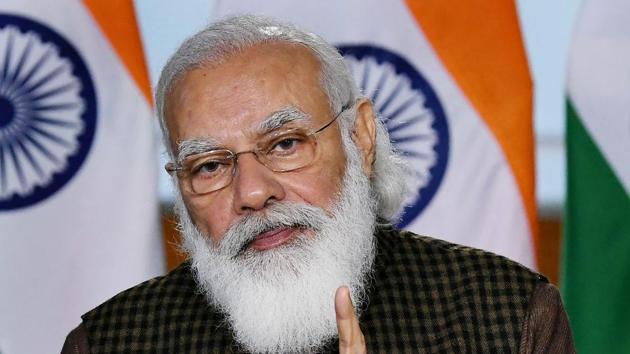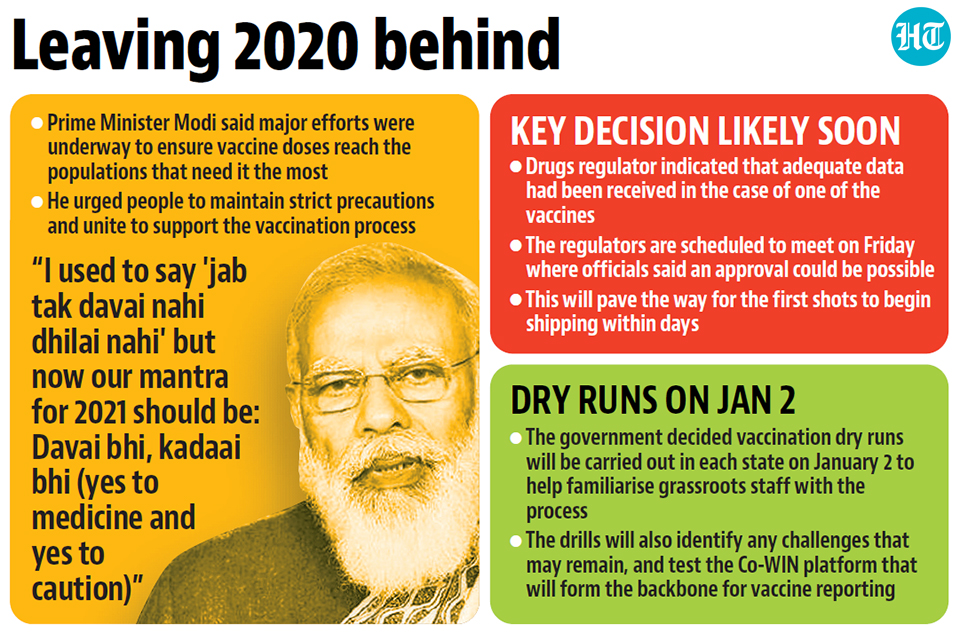2021 brings hope, ready for largest vaccine drive: PM Modi
“For vaccines, every preparation needed is underway. Efforts to get vaccines being made in India to the population that need it the most are being done. India is carrying out major efforts to pull off the world’s largest immunisation drive,” the PM said, inaugurating a new All India Institute of Medical Sciences in Rajkot, Gujarat, over video link from New Delhi.
Massive preparations are underway in India for the launch of the world’s largest vaccination drive against the coronavirus disease (Covid-19), Prime Minister Narendra Modi said on Thursday amid growing indications that the country’s drug regulators would soon approve the first vaccine for a roll-out in the coming days.

Modi said the end of a pandemic-ravaged 2020 had brought with it a new hope, and urged citizens to unite in the vaccination effort in 2021 the same way as they did to reduce infections in the past year.
“For vaccines, every preparation needed is underway. Efforts to get vaccines being made in India to the population that need it the most are being done. India is carrying out major efforts to pull off the world’s largest immunisation drive,” the PM said, inaugurating a new All India Institute of Medical Sciences in Rajkot, Gujarat, over video link from New Delhi.
“In 2020, there was an atmosphere of disappointment and dismay due to the infection. There were doubts everywhere. But 2021 is coming up with a ray of hope in terms of its treatment,” Modi said.
He described the battle against the coronavirus disease as a fight against “an unknown enemy” and urged the people to not believe in rumours, behave “as responsible citizens,” and “refrain from forwarding messages on social media without checking”.
The Prime Minister also said the last day of year was one to “remember India’s millions of doctors, health warriors, sanitation workers, those working in drug stores, and other frontline corona warriors”.
Read more| Elaborate distribution plan on track as India awaits vaccine approval
Three vaccines are being assessed for emergency approval by the Central Drugs Standard and Control Organisation (CDSCO). These are the vaccine candidates developed by Pfizer-BioNTech, which was the first approved anywhere in the world after clinical trials; Serum Institute of India’s (SII) Oxford University-AstraZeneca candidate, which is believed to be the one with the most doses available at the earliest; and one developed by Bharat Biotech International Limited,a completely made-in-India antidote.
According to officials in the government who asked not to be named, the Oxford-AstraZeneca vaccine candidate has emerged as the front-runner for receiving regulatory approval, particularly because it had been green-lighted by the drug regulator in the UK on Wednesday.

Rolling out whichever vaccine is approved will be a challenging task – the government has targeted reaching 300 million people by July, which means over 1.5 million will need to be inoculated on an average every day beginning January.
“…This year showed that when India unites, it can effectively cope with the most difficult crisis. India is in a much better position as a result of the effective steps and India’s record of saving victims of Corona has been much better than other countries,” Modi said.
Later in the day, Union health secretary Rajesh Bhushan presided over a high-level meeting, directing states to gear up for the Covid-19 vaccine roll-out. The government also decided to carry out a drill for vaccinations across the country on January 2, replicating the dry runs held in seven districts in the last week.
“The activity is proposed to be conducted in all state capitals in at least three session sites; some states will also include districts that are situated in difficult terrain or areas that have poor logistical support…,” said the ministry of health and family welfare in a statement.
Read more| 11 foreigners test positive for Covid-19 in Jamshedpur amid scare over mutant variant
According to the health ministry, the main objective of the dry run is to assess the operational feasibility of the Co-WIN application, the digital platform that will form the backbone of vaccination management. The linkages between planning and implementation will also be tested at a large scale, and issues that may lead to challenges during the actual roll-out will be identified.
“The plan is all finalised, which is why dry runs are being conducted to see how it works on the ground. The pilot run helped us identify certain weak spots that are being sorted out, and now the same exercise will be conducted across the country,” said a senior health ministry official, requesting anonymity.
Overall, the vaccination process will include profiling and schedule management of several groups of people. These include 100 million health care workers (who are divided into nine categories), frontline workers such as police and military personnel, disaster management volunteers and municipal workers, and members of the general public most at risk from the virus.
The last group includes the largest numbers, about 270 million. Of these, 260 million are people above the age of 50 who have been categorised as a priority group. The remaining 10 million are expected to be people who are younger but with comorbid conditions associated with a greater risk of disease or mortality.
According to the Centre’s Covid vaccine operational guidelines, the age of a recipient for vaccination will be considered as of January 1, 2021. Anyone born on or before January 1,1971 will fall under this category, and high- risk population group will be further sub-categorised into various age groups with priority to senior citizens above 60 years of age.
The latest electoral rolls for Lok Sabha and state legislative assembly election will be used to identify the population aged 50 years or above.
The Prime Minister also praised the efforts of the Gujarat government in containing the coronavirus outbreak, and spoke on his government’s initiatives in the medical education sector. “We are working on mission mode to improve medical education in India. After the formation of National Medical Commission, the quality and quantity of health education will improve,” he added.






